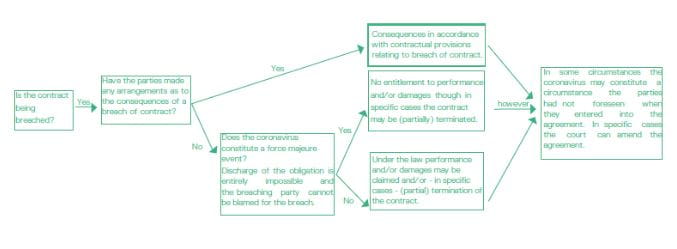
The coronavirus (COVID-19) has not only had an unprecedented impact on society – businesses are also affected. For example, you or your contracting party may be unable to discharge obligations arising from an agreement entered into before the coronavirus crisis. What are the legal consequences of the breach of contract? These consequences are summarised in the above flowchart.
The flowchart relates to breach of contract by a party due to the coronavirus; examples are numerous – eg due to government restrictions, schools and day nurseries are mostly closed and events have been cancelled, and distributors face problems supplying goods which are not available as the result of export and import bans.
If an agreement is breached, the first question that arises is whether the parties have made any arrangements with respect to the consequences of a breach of contract. If so, these arrangements form the guiding principle for dealing with the breach of contract (eg provisions may have been agreed upon relating to performance, damages and termination of the agreement due to the breach of contract, or a combination). Additionally, the agreement may define force majeure events and provide which party will in that case suffer the consequences. These contractual provisions may be broader or more restrictive than statutory provisions in this respect.
If the parties have not made any arrangements with respect to breach of contract, statutory provisions will be applicable. These, too, offer the option to claim performance, damages and termination with or without damages. In any event, a requirement is that the breaching party is to blame for the breach of contract. This is not the case when force majeure occurs.
In particular, a force majeure event occurs if a performing party is prevented from fulfilling its obligations in time. This may be the case, for example, if an event is cancelled on account of prohibitions imposed by the government. The performing party (the event organiser) will in that case be unable to fulfil its obligations in relation to the event visitors. An importer will be unable to discharge its obligation to supply goods if an export ban is imposed on the goods to be supplied. If an event of force majeure occurs, the contracting party will not be entitled to performance and/or damages.
In general, however, the agreement can be terminated in case of force majeure. The coronavirus crisis may justify an exception to this general rule. It may, for example, be unreasonable to terminate a long-term agreement in its entirety if a supplier is unable to supply for a limited period of time. A partial termination would be more appropriate.
If the performing party is able to fulfil its obligations, a force majeure situation does not arise (eg export bans resulting in scarcity and price increases). The goods may be imported from another country at higher prices. If this is a realistic option, the performing party is still able to fulfil its obligations and force majeure does not occur. In that case, the statutory provisions relating to performance, damages and termination are applicable.
Another possible defence is that the coronavirus constitutes a circumstance the parties had not foreseen when they entered into the agreement. This also applies in the event the parties have made arrangements concerning breach of contract in the agreement. As a rule, the parties will not have taken the coronavirus or a similar situation into account when they drafted the agreement and, from a legal perspective, this may be considered an unforeseen circumstance within the meaning of the law.
If, as a result, unmodified maintenance of the agreement would not be reasonable, the court can amend or (partially) set aside the agreement. Please note that the court will do so in exceptional cases only, as the general rule “an agreement is an agreement” continues to apply during the coronavirus crisis as well.
As is evident from the above, the legal consequences of the coronavirus for performance of agreements differ on a case-by-case basis. Please feel free to contact one of our commercial contract experts for a no-obligation response to the questionof how the coronavirus will affect your agreement.